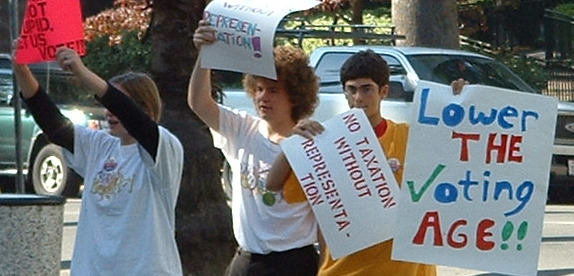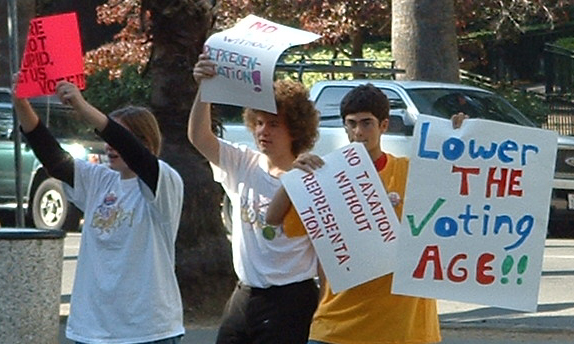Takoma Park Lowers Voting Age to 16
Takoma Park, Maryland, recently lowered its voting age to sixteen for municipal elections. I believe that this is a positive development that other communities should emulate. This Tuesday, Alanna Natanson became the first sixteen year old to legally vote in the United States. I recently spoke with my friend and former colleague, youth rights activist and Takoma Park resident Alex Koroknay-Palicz, who offered some insight.
Around 2003-2004, the National Youth Rights Association (“NYRA”) led a voting age campaign in Takoma Park. Thousands of signatures were gathered and submitted to the local government. Takoma Park was selected as a target because it had a progressive reputation, several youth rights activists were clustered in the D.C. Metropolitan Area, and Maryland was a “local choice state” – a state where the law allowed municipalities to lower their voting ages. Aside from arguably creating an opportunity to build organizational capacity, nothing came of the campaign at the time.
Years later, Takoma Park considered several changes to the city’s voting and election laws, including an amendment to allow convicted felons to vote. Supposedly, Councilman Tim Male was discussing these changes with a representative from FairVote, an organization that once shared office space with NYRA, when the FairVote representative mentioned the voting age issue in passing. The Takoma Park City Council took the idea and ran with it. After some initial apprehension, the City Council voted 6-1 to lower the voting age.
Lowering the voting age will increase voter participation. Sixteen year olds are typically stationary – often residing in communities where they have lived their entire lives. Eighteen year olds are more likely to be living away from home. Intuitively, it seems that sixteen year olds will be more inclined to register to vote. While there isn’t much empirical evidence to support this assertion, what happened in Takoma Park on election day seems to support the proposition. According to The Washington Post, turnout among sixteen and seventeen year olds was four times higher than overall turnout. One hundred and thirty four 16-17 year olds registered to vote, and fifty nine of them actually cast ballots. Takoma Park has a population of about 17,000. This was an off-year election, and every race was uncontested. Koroknay-Palicz states that the number of sixteen and seventeen year olds who voted on Tuesday is significantly higher than the number of eighteen to twenty-five year olds who voted in Takoma Park’s last off-year election.
Critics often contend that sixteen year olds lack the maturity or intellect to properly exercise the right to vote. The United States, however, does not have compulsory voting, and only those sixteen and seventeen year olds who are interested in voting will bother to register.
This was a local election, and only uncontested municipal races were on the ballot. Presumably, in future elections Takoma Park will have to create one set of ballots for sixteen and seventeen year old voters, who can only vote in municipal elections, and another set of ballots for everyone else. This may pose a logistical challenge, and it may be a stumbling block for communities that would otherwise be interested in following Takoma Park’s lead on the voting age issue. I suspect that Takoma Park may have a difficult time complying with the Help America Vote Act, and Maryland law that has adopted electronic voting machines as a state standard.
The Twenty Sixth Amendment does not set the voting age at eighteen. The text of the Amendment prohibits the federal government and the states from denying the right to vote to citizens who are eighteen years or older, on account of age. The Constitution says nothing about younger voters. State election law varies. In 2005, when then New York City Councilwoman Gale Brewer introduced a bill to lower the voting age to sixteen in New York City, I tried to explain that New York was not a “local choice” state and that the effort would hit a brick wall in Albany. The bill died in committee, but it generated significant media attention for NYRA and the Future Voters of America.
Young people who are interested in this issue should research their state’s election law. If the language of the pertinent code is written in a manner analogous to the Twenty Sixth Amendment, they can write to their local elected officials and start a campaign like the one in Takoma Park. It is politically feasible, particularly in smaller municipalities.


